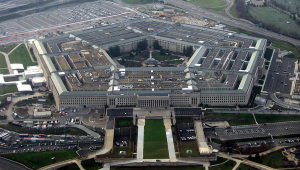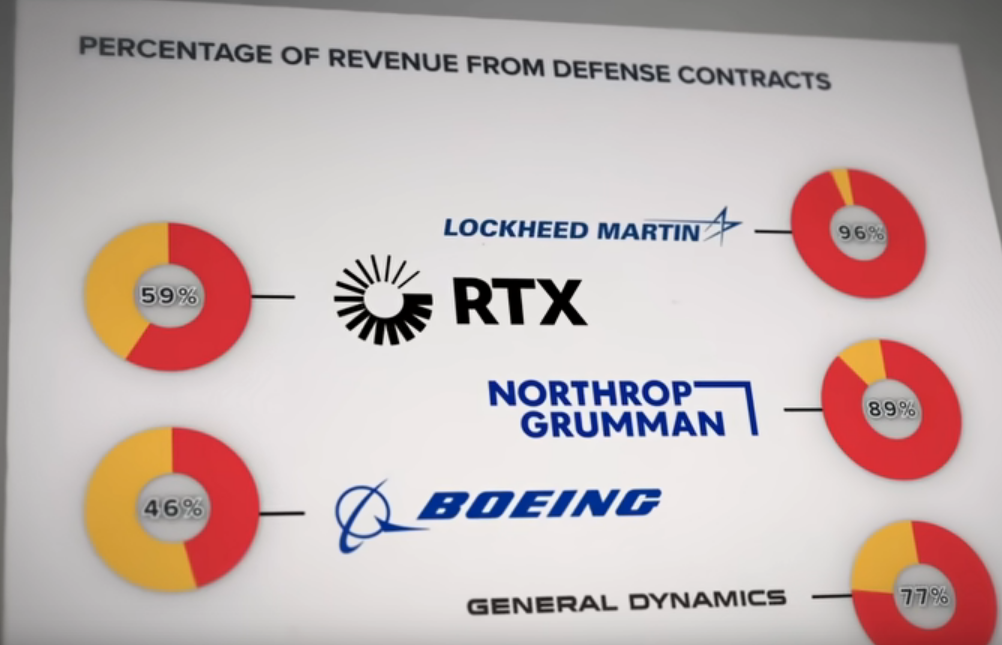Photos: Wikimedia Commons\YouTube Screenshots
America’s national priorities are badly misplaced. Our country spends, with almost no debate, nearly $1 trillion a year on the military while at the same time ignoring massive problems at home.

We apparently have unlimited amounts of money for nuclear weapons, fighter planes, bombs, and tanks. But somehow we can’t summon the resources to provide health care for all, child care, affordable housing, and other basic needs.
The United States remains the world’s dominant military power. Alone, we account for roughly 40 percent of global military spending; the U.S. spends more on its military than the next 10 countries combined, most of whom are allies. Last year, we spent more than three times what China spent on its military.
Not counting supplemental spending, the United States plans to dedicate about $900 billion to the military this year. Almost half of this amount will go to a handful of huge defense contractors enjoying immense profits, which have significantly increased as a result of the war in Ukraine.
Like a majority of Americans, I believe that Ukraine needs the help of the United States and the international community to fight off Russia’s invasion—and that it’s both morally right and strategically necessary to provide them with what they need to do so. But many defense contractors seem willing to capitalize on the war to line their pockets.

In a particularly egregious example, RTX Corporation, formerly Raytheon, has increased prices for its Stinger missiles sevenfold since 1991, leaving the U.S. paying more than $400,000 to replace each missile sent to Ukraine. Even accounting for inflation and improvements to missile technology, that is an outrageous price increase.
Yet somehow, while increasing costs for the American taxpayer by billions, RTX has the money to announce plans to buy back $37 billion in stock through 2025. Taxpayers pay dramatically more. Shareholders get richer.
It’s not just RTX. The stocks of American arms manufacturers have surged: Northrop Grumman’s share price increased 40 percent by the end of 2022, and Lockheed Martin’s by 37 percent. In 2022, the federal government awarded Lockheed Martin more than $45 billion in unclassified contracts. The company returned about one quarter of that amount to shareholders through dividends and stock buybacks, and paid its CEO $25 million.
There’s a name for all this: war profiteering. There’s a solution too.
During World War II, then-Senator Harry Truman decided to investigate the windfall profits made by military contractors who enriched themselves at the expense of millions of servicemen who risked death defending our country.
“Their greed knows no limit,” he said about the contractors who were gouging the government during wartime.
Not much has changed. Congress should resurrect the Truman Committee, a bipartisan special committee designed to rein in defense contractors, closely oversee military contracts, and take back excessive payments.
These companies’ greed is not just fleecing the American taxpayer; it’s killing Ukrainians. A contractor padding its profit margins means that fewer weapons reach Ukrainians on the front lines. Corporate greed is helping Vladimir Putin.
These companies are fully reliant on the U.S. taxpayer, yet their CEOs make about 100 times more than the secretary of defense, and 500 times more than the average newly enlisted service member.

But the Pentagon bears a big share of the blame too. The Defense Department has been plagued by waste, fraud, and financial mismanagement for decades. In fact, the DOD remains the only federal agency that cannot pass an independent audit—a requirement under federal law since the early 1990s.
Last year, the DOD failed its sixth audit, and was unable to fully account for 63 percent of its $3.8 trillion in assets. And every year, auditors discover billions of dollars in the Pentagon’s proverbial couch cushions. In 2022, the Navy audit found $4.4 billion in previously untracked inventory, while the Air Force identified $5.2 billion worth of variances in its general ledger.
It should therefore come as no surprise that defense contractors routinely overcharge the Pentagon—and the American taxpayer—by nearly 40 to 50 percent. One company, TransDigm, overcharged by 4,451 percent. Taxpayers are getting wise to this graft: Data for Progress found that 80 percent of likely voters believe that the Defense Department should be required to pass an independent audit before Congress increases its budget by another nickel.
But despite billions in fines for fraud or misconduct, the contracts never seem to dry up. That may be down to America’s system of legalized bribery: A share of the profits from these lucrative contracts will flow back to politicians who gladly accept millions in campaign contributions to make sure the defense budget is always flush. According to the watchdog group OpenSecrets, defense contractors spent nearly $140 million lobbying the federal government last year. Millions of dollars more go directly to members of Congress in campaign contributions from companies, individuals, and political-action committees linked to the defense industry.

In the 1990s, there were 51 major defense contractors in this country. Today, they have consolidated into five giants: Lockheed Martin, RTX, Boeing, General Dynamics, and Northrop Grumman. These big five can use the monopoly positions granted them by the United States government to reap enormous profits. In fact, in fiscal year 2022, they shared more than $118 billion in Pentagon contracts.
Congress must put an end to this form of corporate welfare. The best way to do that is to reinstate the Truman Committee on war profiteering so that we can end corporate greed in the defense industry. A windfall-profits tax could help achieve this end as well.
No one denies that we need a strong military. But, like every other agency of government, it must be run efficiently and cost-effectively. It cannot simply be a cash cow for a handful of giant corporations.
Independent Senator Bernie Sanders represents the state of Vermont.








